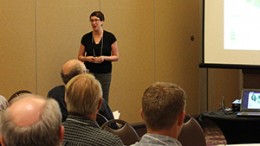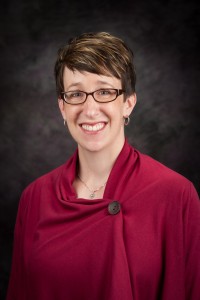 Growing up as a rancher’s daughter in Montana, Dr. Mykel Taylor never imagined she would have a degree in agriculture, let alone a Ph.D.
Growing up as a rancher’s daughter in Montana, Dr. Mykel Taylor never imagined she would have a degree in agriculture, let alone a Ph.D.
“I was going to be a high school science teacher and a girls’ basketball coach, that’s what I wanted to do,” said Taylor. “When I thought of a degree in agriculture, I just assumed that meant you were going to be a farmer or a rancher.”
After an inspiring international experience, Taylor realized that there was a completely different side to agriculture involving science,
Taylor says she was an animal science student at Montana State University and eventually switched into ag business.,“I loved the whole Econ thing, it was about people. It wasn’t about math or money. I find explaining why people do what they do, pretty darn fascinating.”
After a couple of internships and receiving funding, Taylor was on her way to Kansas where she worked as an extension assistant. It was here that Taylor really discovered the power of extension. She knew she wanted to be an extension economist, which required a Ph.D., so off to North Carolina she went.
“That was four years of hell in graduate school, but it was worth it because I knew I wanted to do extension,” said Taylor.“I just thought it was so cool that we would work on questions or issues, go out into a meeting and you would be talking to people and they actually cared. They would engage and ask you questions and they would call you on your stuff. It was a hard job but it was very satisfying to be impactful in people’s lives.”
Upon graduating, Taylor took an extension position at Washington State University. However, Kansas still held a special place in her heart and the Taylor family moved back to Kansas where they’ve lived for the past five years.
“I think it was just one of those things, I call it my apprenticeship in extension at K-State, and it was very influential. To get to come back here, and do it was so cool,” said Taylor.
The majority of the Taylor’s extension work Taylor involves land and leasing, understanding and tracking the land market and then helping people with those issues. Kansas land values and the cost of leasing is a hot topic when discussing the current farm crisis.
“When I got here, we were in the middle of these good years, with a lot of money floating around and it was a question of how much could you pay to rent ground and were you paying enough. That was what we were talking about in 2012 and 2013,” said Taylor. Commodity prices started to drop in 2014 and stayed low throughout 2015, with that drop, came the decrease in profit margins.
“One of the big outputs that I put out is an estimate of what somebody could afford to pay if they were renting, and it is based on a budget. That budget has both revenue and cost, and all of a sudden we went from having this huge profit margin to having a very tiny profit margin,” said Taylor. “I was looking at numbers that were half or a third of what those other numbers were.” The question was, could people keep renting with land prices being as competitive as they are? The small profit margins and high land prices are what pushed Taylor to really look at the issue.
“I got a phone call from a land owner who was upset with his tenant, because the tenant charged him to haul his grain and I think we will see more of that, this is people’s livelihood,” Taylor said. “If I can do anything to help them make the best decisions, my job is not to help people keep farming, my job is to help people make the best decisions that they can…The challenge that comes with helping people make decisions, is not knowing everyone’s situation and remembering that the decision is ultimately up the farmer and the other people involved in running their business. I think it is recognizing that there are limits to what economic analysis can do.”
A small part of Taylor’s extension work includes the Women in Agriculture program facilitated by the department. Women in Ag is designed to deliver information and training on a variety of topics specifically for farm women.
“If I get asked to do a Women in Ag event, I hardly ever say no if I can make it,” said Taylor. “It’s so much fun because we have some great conversations, occasionally we get off topic, but there’s always great stories and ideas. The learning dynamic is different and I enjoy it very much. There is the element of personal relations, what I call soft skills, that is part of my extension program and I think it’s made more interesting. I am interested and passionate about it and I think that has definitely helped me.”
